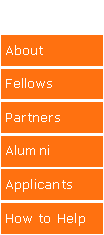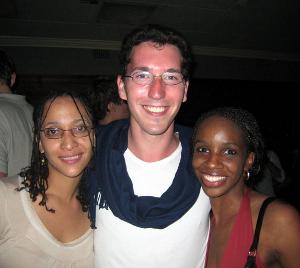



|
Fellows’ Flyer |
|
March 2009 |
|
News and views for and by Princeton in Africa Fellows |
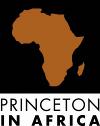

|
In this Issue: |
|
Highlights from 2008-2009 Fellows Tom McKay in Kenya and Carolina Danspeckgruber in South Africa |
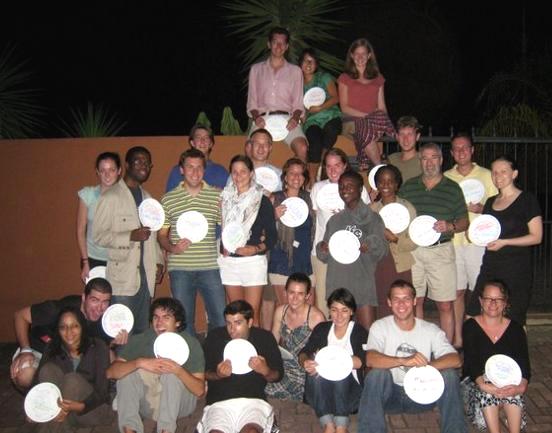
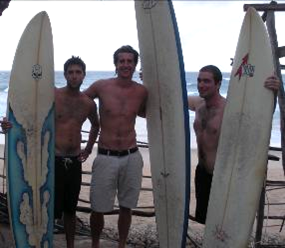
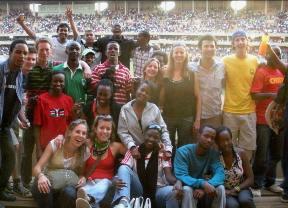
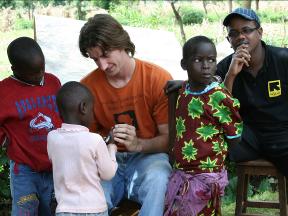
|
2008-2009 Fellows’ Retreat February 5-9 | Nelspruit, South Africa |

|
A Wall Street recruiter, trying to sell me on a first year analyst position, once said: “Sure, the work you’ll be doing won’t always be glamorous, but it will give you a really broad view of the many different aspects of the business.” She could have just as easily been talking about my job at the International Rescue Committee. I do the unglamorous work of writing funding proposals for new projects and progress reports on current ones, assuring that money keeps flowing to the IRC’s programs. IRC Kenya provides healthcare and a number of other services to the 140,000 residents of Kakuma and Hagadera refugee camps, located near the Sudanese and Somali borders respectively. After Kenya erupted in ethnic violence in early 2008, we also provided relief to some 30,000 internally displaced persons in Western Kenya.
My work gives me a broad view of the business of humanitarian aid, as it exposes me to everything from programs and media to logistics and finance to dealing with donors and government officials. This exposure is important, because in a field as utterly complex as this one, it helps to know a little bit about each of the different factors that determines how, and whether, aid works. That’s my job in a nutshell, and it has been an extremely enjoyable and educational experience.
All that I have learned behind my desk however, is dwarfed by what I have learned away from it. I could fill a small book with anecdotes, some that are simply wild stories, others that are accompanied by life lessons that might just bring a tear to your eye. But alas I only have 500 words. Therefore I give you, in brief:
The Top Ten (For Better or For Worse) Most Memorable Moments of Tom’s Time In Kenya
10) Eating a freshly sacrificed goat – including a bite of his intestine – in the tin-roofed home of a Kikuyu family
9) Being featured in a New York Times editorial for my tale of Kenya’s jubilee on November 5th
8) Sitting next to a friend’s Dad – a pre-Mau Mau colonialist of the first degree – while he asks me what the British ever took from Kenya
7) Watching the sunset from a floating bar in the middle of the Indian Ocean
6) Eating one of the finer meals of my life – and certainly the finest I’ve had in Nairobi – at a UN conference concerning the food crisis in Kenya
5) Playing soccer in front of a crowd of hundreds on a rock-strewn field in rural Kenya and having kids swarm me after the game because I bear a striking resemblance (in looks not ability) to the Manchester United goalkeeper
4) Getting a 12-day bout of food poisoning in my first month here, going to a doctor’s office with chickens pecking around the front door, and receiving my prescription on the back of a cut up Kleenex box
3) Arriving at the airport at 11:30 for an 11:40 international flight, and wink-wink nudge-nudging my way on board the idling plane
2) Walking through the hospital at Kakuma refugee camp, witnessing death and disease for the first time in my life
1) Having an AK-47 pointed at my head by a bribe-seeking police officer, and ducking to the floor as my friend hit the gas pedal and sped away |
|
by Tom McKay, ‘08-’09 Fellow at the International Rescue Committee in Kenya |
|
Notes from the Field |
|
Tom engaged in the time-honored tradition of showing kids their own picture |
|
Tom (in yellow shirt) and friends at a World Cup qualifying match |
|
Tom (center) went surfing in Mozambique with fellow PiAfers Kevin Block and Stu Campo. Picture by Tim Callahan. |
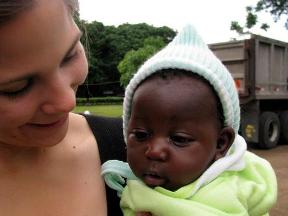
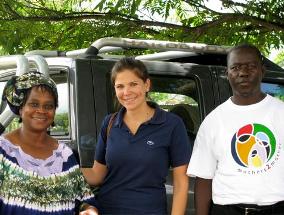

|
Carolina (center) with m2m staff in Livingstone, Zambia |
|
by Carolina Danspeckgruber, ‘08-’09 Fellow at mothers2mothers in South Africa |
|
Notes from the Field |
|
One of the workshop participants, Josephine, with her Body Map |
|
How did you find out you were HIV positive? How did you feel, and was there someone you could talk to? How did you see yourself and the rest of your life, when you got the result? What do you think the HI Virus looks like? What colors is it? What is the shape of the virus?
These were all questions that were asked during a two-day body mapping workshop, which I had the opportunity to help pilot in Livingstone, Zambia. Body mapping is a psychosocial support tool used to help people tell their life stories. In the past, body mapping has been used by psychologists and social workers in order to help patients and clients get a better understanding of themselves, their bodies, and the world in which they live. Often people living with HIV are made to feel that the virus is a death sentence and the essence of their identity. By giving a group of individuals who are living with HIV the opportunity to draw and talk about the fact that the HI Virus is a manageable disease, body mapping encourages these individuals to develop fresh insights and explore various other facets of their identity. Body mapping allows participants to clearly illustrate and acknowledge their various support systems, their life goals and hobbies as well as how the virus specifically affects their body. The mapping exercise also helps people living with HIV to better understand their antiretroviral (ARV) treatment, the side-effects of ARVs, and more about how our bodies work. Having the chance to help organize and participate in this workshop, with 13 mothers2mothers women, was one of the most unforgettable experiences of my life. Hearing their life stories and their daily challenges due to their HIV-positive status as well as that of their husbands’ was an extraordinarily humbling experience.
I am one of two Princeton in Africa Fellows working with mothers2mothers (m2m) in Cape Town, South Africa, this year. m2m is a South African-based NGO that provides education and support for pregnant women and new mothers living with HIV/AIDS. m2m’s
services focus on preventing mother-to-child transmission (MTCT) of HIV
during pregnancy and delivery and providing psychosocial support to
recently diagnosed pregnant women and mothers. m2m’s
peer education and empowerment program is run by “Site Coordinators”
and “Mentor Mothers” who themselves are living with HIV and have
recently delivered a HIV-negative baby. Site Coordinators are
permanently employed and Mentor Mothers typically work for 13-month
terms, receiving a daily wage for their services. After 13 months,
efforts are made to find retiring Mentor Mothers jobs in the community
or health care system and new Mentor Mothers are identified for
training. Viewing mothers as an inexhaustible resource within
communities, m2m chooses to rotate Mentor Mothers in order to educate and empower as many women living with HIV as possible. Providing paid employment for mothers living with HIV benefits the women working as Mentor Mothers, the communities from which they come, and the health care facilities where they work. Mentor Mothers are dedicated employees who benefit directly from income they generate for their families. They also attain valuable professional skills that contribute to future employment. Communities benefit from a growing resource of educated and empowered women who promote healthy attitudes and behaviors in relation to HIV. Because Mentors are paid employees, m2m has been able to implement accountability standards and invests significant time and resources into their training. The professional nature of the program has resulted in m2m staff being seen as an invaluable resource to health care facilities where they are working.
m2m has expanded by over 700% over the past three years from 65 sites in South Africa in January 2006 to 474 sites in seven African countries in January 2009. I am shadowing the Co-founder and Executive Director for the year and have had the opportunity to work on a spectrum of projects. From three-year strategic plans and report writing to assisting with various legal board documents, these past eight months have been fascinating. I also keep busy by helping out various members of the management team however I can. My favorite part of being at m2m has been getting to know some of the Mentor Mothers and Site Coordinators who are so dedicated to and empowered by their work. The amount of strength and joy these women embody and radiate is forever humbling.
Between the fantastic and essential services that the m2m program provides to the diverse spectrum of activities that Cape Town has to offer, I feel extraordinarily privileged to be here for the year! |

|
Carolina with the HIV-negative baby of one of m2m’s Site Coordinator’s in Cape Town, South Africa |
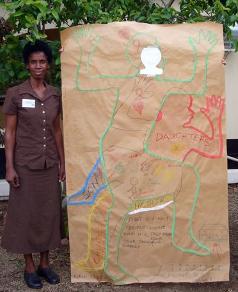
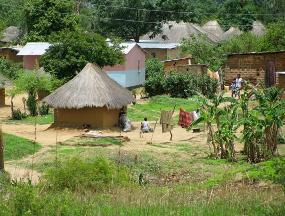
|
Livingstone, Zambia |
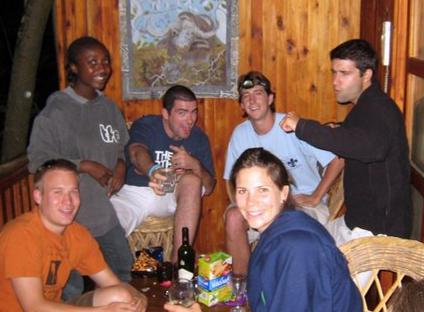
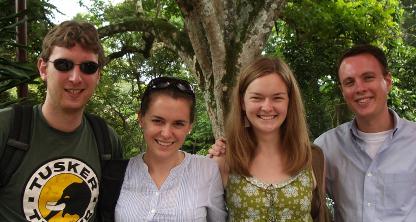
|
Click here to see more photos from our Fellows’ Retreat |
|
Happy Birthday |
|
March 8 Marilyn Michelow Katie White
March 11 Brad Milligan
March 17 Lindsey Locks |
|
March 18 Becca Pass
March 19 Adam Herling
March 27 Jenn Ruskey |


